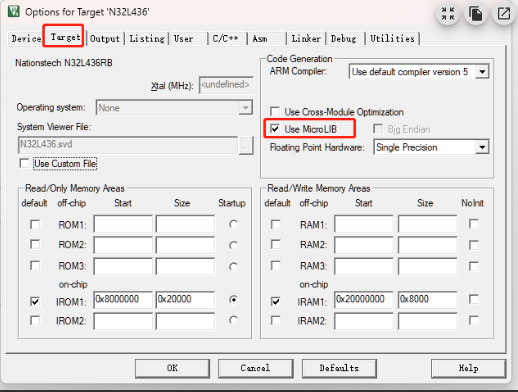

 【国民技术N32项目移植】N32L43XRL-STB串口调试 使用printf打印日志
【国民技术N32项目移植】N32L43XRL-STB串口调试 使用printf打印日志
电子说
1.4w人已加入
描述
通过串口输出打印信息
- 添加log.c
#include "log.h" #if LOG_ENABLE #include "n32l43x.h" #include "n32l43x_gpio.h" #include "n32l43x_usart.h" #include "n32l43x_rcc.h" #define LOG_USARTx USART1 #define LOG_PERIPH RCC_APB2_PERIPH_USART1 #define LOG_GPIO GPIOA #define LOG_PERIPH_GPIO RCC_APB2_PERIPH_GPIOA #define LOG_TX_PIN GPIO_PIN_9 #define LOG_RX_PIN GPIO_PIN_10 void log_init(void) { GPIO_InitType GPIO_InitStructure; USART_InitType USART_InitStructure; GPIO_InitStruct(&GPIO_InitStructure); RCC_EnableAPB2PeriphClk(RCC_APB2_PERIPH_AFIO | LOG_PERIPH_GPIO, ENABLE); RCC_EnableAPB2PeriphClk(LOG_PERIPH, ENABLE); GPIO_InitStructure.Pin = LOG_TX_PIN; GPIO_InitStructure.GPIO_Mode = GPIO_Mode_AF_PP; GPIO_InitStructure.GPIO_Slew_Rate = GPIO_Slew_Rate_High; GPIO_InitStructure.GPIO_Alternate = GPIO_AF4_USART1; GPIO_InitPeripheral(LOG_GPIO, &GPIO_InitStructure); GPIO_InitStructure.Pin = LOG_RX_PIN; GPIO_InitStructure.GPIO_Pull = GPIO_Pull_Up; GPIO_InitStructure.GPIO_Alternate = GPIO_AF4_USART1; GPIO_InitPeripheral(LOG_GPIO, &GPIO_InitStructure); USART_InitStructure.BaudRate = 115200; USART_InitStructure.WordLength = USART_WL_8B; USART_InitStructure.StopBits = USART_STPB_1; USART_InitStructure.Parity = USART_PE_NO; USART_InitStructure.HardwareFlowControl = USART_HFCTRL_NONE; USART_InitStructure.Mode = USART_MODE_RX | USART_MODE_TX; // init uart USART_Init(LOG_USARTx, &USART_InitStructure); // enable uart USART_Enable(LOG_USARTx, ENABLE); } int fputc(int ch, FILE* f) { USART_SendData(LOG_USARTx, (uint8_t)ch); while (USART_GetFlagStatus(LOG_USARTx, USART_FLAG_TXDE) == RESET) ; return (ch); } #ifdef USE_FULL_ASSERT __WEAK void assert_failed(const uint8_t* expr, const uint8_t* file, uint32_t line) { log_error("assertion failed: `%s` at %s:%d", expr, file, line); while (1) { } } #endif // USE_FULL_ASSERT #endif // LOG_ENABLE #endif // LOG_ENABLE#endif // LOG_ENABLE - 添加log.h
#ifndef __LOG_H__ #define __LOG_H__ #ifndef LOG_ENABLE #define LOG_ENABLE 1 #endif #if LOG_ENABLE #include#define LOG_NONE 0 #define LOG_ERROR 10 #define LOG_WARNING 20 #define LOG_INFO 30 #define LOG_DEBUG 40 #ifndef LOG_LEVEL #define LOG_LEVEL LOG_DEBUG #endif #if LOG_LEVEL >= LOG_INFO #define log_info(...) printf(__VA_ARGS__) #else #define log_info(...) #endif #if LOG_LEVEL >= LOG_ERROR #define log_error(...) printf(__VA_ARGS__) #else #define log_error(...) #endif #if LOG_LEVEL >= LOG_WARNING #define log_warning(...) printf(__VA_ARGS__) #else #define log_warning(...) #endif #if LOG_LEVEL >= LOG_DEBUG #define log_debug(...) printf(__VA_ARGS__) #else #define log_debug(...) #endif void log_init(void); #else /* !LOG_ENABLE */ #define log_info(...) #define log_warning(...) #define log_error(...) #define log_debug(...) #define log_init() #endif #define log_func() log_debug("call %s [%d]\\r\\n", __FUNCTION__,__LINE__) #endif /* __LOG_H__ */ #endif /* __LOG_H__ */ #endif /* __LOG_H__ */ - man调用
int main(void) { log_init(); log_func(); //assert_param(0); while (1) { } } }}
异常处理
-
若无法正常打印信息,则查看keil5配置,需要 打开use microLIB

审核编辑:汤梓红
声明:本文内容及配图由入驻作者撰写或者入驻合作网站授权转载。文章观点仅代表作者本人,不代表电子发烧友网立场。文章及其配图仅供工程师学习之用,如有内容侵权或者其他违规问题,请联系本站处理。
举报投诉
-
【国民技术N32项目移植】easypower 结论2023-02-28 2429
-
【国民技术N32项目移植】BMS项目移植Angel_YY 2023-02-27
-
【国民技术N32项目移植】FOC项目移植之环境搭建2023-02-24 1591
-
【国民技术N32项目移植】 串口支持printf有坑2023-02-18 584
-
【国民技术N32项目移植】 RTT tcpclient测试2023-02-16 1129
-
【国民技术N32项目移植】项目提交-物联网心率监控设备2023-02-12 2148
-
【国民技术N32项目移植】5. ADC应用以及跳坑总结2023-02-02 2283
-
【精品合集】国民技术N32开源移植挑战赛作品合集2023-01-10 131426
-
【国民技术N32项目移植】N32L43XRL-STB串口调试 nr_micro_shell移植2023-01-05 2971
-
【国民技术N32项目移植】N32L43XRL-STB项目移植之基于IIC接口的OLED2022-12-23 2468
-
【国民技术N32项目移植】N32G345XVL-STB项目移植 ——开箱及开发环境搭建2022-12-03 2472
-
N32L43XRL-STB (LQFP64) 开发板2022-11-10 393
-
国民技术N32G43XRL-STB开发板资料2022-11-07 567
-
N32L43XRL-STB开发板硬件使用指南2022-11-01 1237
全部0条评论

快来发表一下你的评论吧 !


